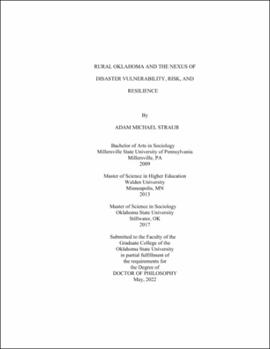| dc.description.abstract | The concepts of vulnerability, risk, and resilience have experienced a meteoric rise in academic attention among disaster scholars over the past three decades. Vulnerability operates as the set of social conditions which predispose certain populations or social spaces to inequitable environmental burdens precipitated by disaster. The prolific study of risk has led to a robust set of literatures which tell us how people in a variety of contexts perceive and understand risks associated with natural hazards. Research focusing on disaster resilience elucidate the qualities and behaviors which allow social individuals, groups, and systems to cope and adapt to disaster. While these studies have furthered our collective understanding of what factors contribute to adverse outcomes, or allow certain groups to successfully navigate the dangers of environmental hazards, few have focused on how these concepts operate prior to disasters. Moreover, most disaster research has privileged urban areas. Given our current understanding of climate change, rural areas in the Midwest are positioned to experience some of the most severe socio-economic outcomes. Adapting the Community Capitals Framework to a disaster context, this dissertation uses qualitative methodology to analyze 56 semi-structured, in-depth interviews drawn from two distinct rural areas of Oklahoma to explore the nexus of vulnerability, risk, and resilience. Broadly, a deteriorating, reciprocal, and mutually reinforcing relationship between rural spaces and urban areas have led to a cognitive and geographic rural-urban divide. A combination of politically conservative economic policy, a systematic divestment from social welfare programs, and a combination of rural stoicism and cultural stigma creates, maintains, and exacerbates a condition called community disenfranchisement. Rural communities experience feelings of abandonment and neglect and direct that animosity toward urban areas and government agencies. Perceptions of isolation lead to rural insulation as distal communities seal themselves off from larger institutions. Despite this deleterious relationship, rural communities turn to one another, forging constellations of bonding social capital to stitch together what few resources they do have to cultivate resilience. The current study also offers important implications and best practices for cultivating resilience in rural spaces while demonstrating a need for improving social relations across the rural/urban divide. | |
